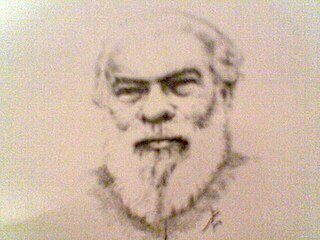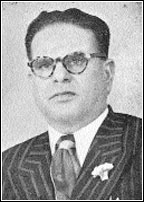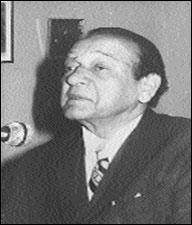
Sir Malik Ghulam Muhammad was a Pakistani politician and economist who served as the third governor-general of Pakistan from 1951 to 1955.

Wazir Mansion, officially known as Quaid-e-Azam Birthplace Museum is a former family home in the Kharadar district South at Karachi, Sindh, Pakistan which is considered the birthplace of the country's founder, Muhammad Ali Jinnah.

Soldier Bazar is a bazaar and neighborhood in Karachi East district of Karachi, Pakistan. It was previously administered as part of Jamshed Town, which was disbanded in 2011.

Mazar-e-Quaid, also known as Jinnah Mausoleum or the National Mausoleum, is the final resting place of Muhammad Ali Jinnah, the founder of Pakistan. Designed in a 1960s modernist style, it was completed in 1971, and is an iconic symbol of Karachi as well as one of the most popular tourist sites in the city. The mausoleum complex also contains the tomb of Jinnah's sister, Māder-e Millat Fatima Jinnah, as well as those of Liaquat Ali Khan and Nurul Amin, the first and eighth Prime Ministers of Pakistan respectively. The tomb of Sardar Abdur Rab Nishtar, a stalwart of the Muslim League from Peshawar, is also located there.

Raza Hussain also known as Allama Rasheed Turabi was an Islamic scholar, religious leader, public speaker, poet and philosopher.

Ruth Katherina Martha Pfau, FCM was a German–Pakistani Catholic Christian religious sister and physician who was a member of the "Society of the Daughters of the Heart of Mary". She emigrated from Germany in 1961 and devoted more than 55 years of her life to fighting leprosy in Pakistan. Pfau was honoured with Hilal-e-Pakistan, Hilal-i-Imtiaz, Nishan-i-Quaid-i-Azam, and the Sitara-i-Quaid-i-Azam awards.

Mian Raza Rabbani is a Pakistani politician and lawyer who served as the 7th Chairman of the Senate of Pakistan from March 2015 to March 2018. He has been affiliated with the Pakistan Peoples Party since 1968.

Syed Shamsul Hasan was a leader of the Pakistan Muslim League and before independence of All India Muslim League.
Muhammad Yusuf Abdullah Haroon was a Pakistani businessman and politician who served as the 5th Governor of West Pakistan and 3rd Chief Minister of Sindh.

Muhammad Hashim Gazdar was one of the three representatives from Sindh to the Constituent Assembly of Pakistan, and the second Deputy Speaker of the National Assembly of Pakistan.

The Quaid-e-Azam House, also known as Flagstaff House, is a house museum dedicated to the personal life of Muhammad Ali Jinnah, the founder of Pakistan. Located in Karachi, Sindh, Pakistan, it was designed by British architect Moses Somake.

The Jinnah family was a political family of Pakistan. It has played an important role in the Pakistan Movement for creation of Pakistan, a separate country for Muslims of India. The family held the leadership of All-India Muslim League, and its successor, Muslim League, until it was dissolved in 1958 by martial law.
Polo Ground, Karachi, also known as Gulshan-e-Jinnah or Bagh-i-Quaid-i-Azam, is a park located on Dr. Ziauddin Ahmed Road and Aiwan-e-Sadar Road in Karachi, Sindh, Pakistan. This park is spread over 20 acres and has a football ground, Japanese garden, children's recreation area, bird aviary, and jogging tracks. A baradari is also located there. It also has two five-star hotels nearby. The ground also hosts the biggest Eid congregation in Karachi.

On June 15, 2013, the historical Quaid-e-Azam Residency, which housed the founder of Pakistan, Quaid-e-Azam Muhammad Ali Jinnah, in his last two months and ten days, was attacked and completely burnt down by militants belonging to the Balochistan Liberation Army. The reconstruction work was completed and the reconstructed Ziarat Residency was inaugurated on Independence Day which is on 14 Aug, 2014.
Sharif al Mujahid was a Pakistani journalist, historian, author, and professor.

Sultan Ali Allana is a prominent Pakistani banker, philanthropist,and business leader. He is also the chairman of Habib Bank Limited and a director of the Aga Khan Fund for Economic Development.













